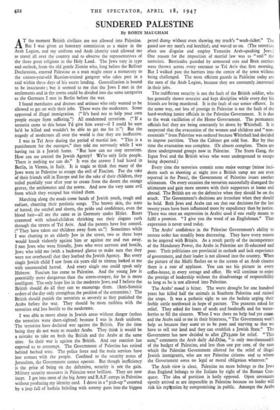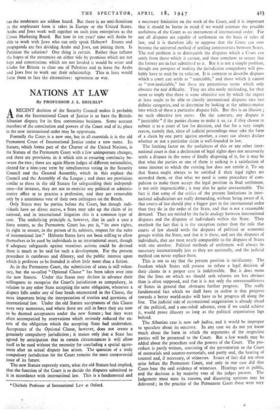SUNDERED PALESTINE
By ROBIN MAUGHAM
AT the moment British civilians are not allowed into Palestine. But I was given an honorary commission as a major in the Arab Legion, and my uniform and Arab identity card allowed me
to travel all over the country and to observe the representatives of the three great religions in the Holy Land. The Jews vary in type and outlook, from the old gentle Zionist who, long before the Balfour Declaration, entered Palestine as a man might enter a monastery to the sixteen-year-old Russian-trained gangster who takes part in a raid within three days of his secret landing. Generalisation is bound to be inaccurate ; but it seemed to me that the Jews I met in the settlements and in the towns could be divided into the same categories as the Germans I met in Berlin before the war.
I found merchants and doctors and artisans who only wanted to be allowed to get on with their jobs. These were the moderates. Some approved of illegal immigration. (" It's hard not to help your own people escape from suffering.") All condemned terrorism. (" If a terrorist came to this house I'd give him away—if I could be sure he'd be killed and wouldn't be able to get me for it.") But the tragedy of moderates all over the world is that they are ineffective.
I was in Tel Aviv during the period of martial law. " This is a punishment for the outrages," they told me nervously while I was having tea in a Jewish home. " But how can we stop terrorism. How can we control the Jewish Agency? We're only little people. There is nothing we can do." It was the answer I had heard in Berlin, in Vienna, in Italy. It is tragic to think that many of the Jews went to Palestine to escape the evil of Fascism. For the sake of their friends still in Europe and for the sake of their children, they toiled painfully year after year to create from the desert the orange groves, the settlements and the towns. And now the very same evil from which they escaped has visited them.
Marching along the roads come bands of Jewish youth, tough and radiant, chanting their patriotic songs. The brown skin, the stare of hatred, the satchel and shorts, the pride and confidence, even the blond hair—all are the same as in Germany under Hitler. Buses crammed with school-children shrieking out their slogans rush through the streets of Tel Aviv. And the parents have lost control. (" They have taken our -children away from us.") Sometimes while I was chatting to an elderly Jew in the street, two or three boys would knock violently against him or against me and run away. I met Jews who were friendly, Jews who were nervous and hostile, Jews who told me (with a backward glance to make sure that they were not overheard) that they loathed the Jewish Agency. But every single Jewish child I saw from six years Old to sixteen looked at me with unconcealed hatred. And every single one could speak only Hebrew. Fascism has come to Palestine. And the young Jew is potentially more dangerous than the storm-trooper, for he is more intelligent. The only hope lies in the moderate Jews, and I believe the British should do all they can to encourage them. (Anti-Semitic orders of the day only strengthen the position of the extremists.) The British should punish the terrorists as severely as they punished the Arabs before the war. They should be more ruthless with the terrorists and Less hostile to the moderates.
I was able to move about in Jewish areas without danger (unless the terrorists were short-sighted) because I was in Arab uniform. The terrorists have declared war against the British. For the time being they do not want to murder Arabs. They think it would be a mistake to take on both the British and the Arabs at the same time. So their war is against the British. And our reaction has exposed us to contempt. The Government of Palestine has retired behind barbed wire. The police force and the main services have lost contact with the people. Confined to the security zones of Jerusalem, the Government cannot operate. But though inefficiency is the price of being on the defensive, security is not the gain. Military security measures in Palestine were brilliant. They are now inept. I got into most of the big Army and R.A.F. camps in Palestine without producing my identity card. I drove in a " pick-up " escorted by a jeep full of beduin bristling with tommy guns into the biggest petrol dump without even showing my truck's "work-ticket." The guard saw my men's red kerchiefs and waved us on. (The terrorists often use disguise and employ Yemenite Arab-speaking Jews.) One reason for the imposition of martial law was to " seal " the terrorists. Barricades guarded by armoured cars and Bren carriers were thrown across every entrance to Tel Aviv that first morning. But I walked past the barriers into the centre of the town without being challenged. The most efficient guards in Palestine today are the men of the Arab Legion, because they are constantly_interested in their jobs.
The indifferent security is not the fault of the British soldier, who has generally shown restraint and kept discipline while every day his friends are being murdered. It is the fault of our senior officers. In the same way, our loss of prestige in Palestine is not the fault of the hard-working junior officials in the Palestine Government. It is due to the weak vacillation of the Home Government. The permanent officials feel they are being constantly let down by Whitehall. It is suspected that the evacuation of the women and children and " non- essentials " from Palestine was ordered because Whitehall had decided to impose partition. Then the Cabinet got cold feet. But by that time the evacuation was complete. (Or almost complete. There are three underground groups now in Palestine. The Stern Gang, the Irgun Svai and the British wives who went underground to escape being deported.) Every time the terrorists commit some major outrage (minor inci- dents such as shooting at night into a British camp are not even reported in the Press), the Government of Palestine issues another ultimatum. On every occasion the terrorists successfully disregard the ultimatum and gain more renown with their supporters at home and abroad. The British are on the defensive when they should be on the attack. The Government's decisions are irresolute when they should be bold. Both Jews and Arabs can see that our decisions for the last twenty years have been influenced more by expediency than by justice. There was once an expression in Arabic used if one really meant to fulfil a promise. " I give you the word of an Englishman." That expression is never used today.
The Arabs' confidence in the Palestine Government's ability to restore order has steadily been decreasing. They have every reason to be angered with Britain. As a result partly of the incompetence of the Mandatory Power, the Arabs in Palestine are ill-educated and poor. Their politicians are provincial in outlook and lack experience of government, and their leader is not allowed into the country. When the picture of the Mufti flashes on to the screen of an Arab cinema there is a roar of applause. You can see his picture in every coffee-house, in every cottage and office. He will continue to enjoy the prestige of leadership without the disadvantage of responsibility so long as he is not allowed into Palestine.
The Arabs' mood is bitter. The worst drought for one hundred years has killed half the animals in Southern Palestine and ruined the crops. It was a pathetic sight to see the beduin urging their feeble cattle northward in hope of pasture. The peasants asked for relief. They asked for loans of seeds and foodstuffs and for water- lorries to fill the cisterns. When I was there no help had yet come. and the Arabs said to me in their bitterness, " The Government won't help us because they want us to be poor and starving so that we have to sell our land and they can establish a Jewish State." The Government has now decided to allot LP23,000 for relief. " This sum," comments the Arab daily Ad-Difaa, " is only one-thousandth
of the budget of Palestine, and less than one per cent. of the sum which the Palestine Government allotted for the relief of illegal Jewish immigrants, who are not Palestine citizens and to whom the Government owes no legal or moral obligation whatever."
The Arab view is clear, Palestine no more belongs to the Jews than England belongs to the Italians by right of the Roman Con- quest. The idea of partition is hotly opposed. ("pen covenants openly arrived at are impossible in Palestine because no leader will risk his reptation by compromising in public. Amongst the Arabs too the moderates are seldom heard. But them is no anti-Semitism in the unpleasant form it takes in Europe or the United States. Arabs and Jews work well together on such joint enterprises as the Citrus Marketing Board. But how in ten years' time will Arabs be able to work with Jews who can only speak Hebrew? Events and propaganda are fast dividing Arabs and Jews, not joining them. Is Partition the solution? One thing is certain. Rather than inflame the hopes of the extremists on either side by promises which are not kept and commissions which are not heeded it would be wiser and kinder for Britain to clear out of Palestine and to leave the Arabs and Jews free to work out their relationship. This at least would force them to face the alternatives: agreement or war.



































 Previous page
Previous page